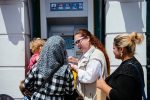Migration Crisis and State Fragility
In September 2016, the Leir Institute was awarded a two-year, $1.0 million grant from the Carnegie Corporation of New York to develop strategies on bridging the academic-policy gap. This research was concluded in 2019.
The substantive focus of this research project examines how current migration flows affect citizen perceptions of the state, and therefore, challenge the legitimacy of the state. The research team is focusing on two regions – Europe and the Americas – to investigate how state and local authorities are managing migration challenges, and how these challenges may be affecting the perceived legitimacy of such authorities in “transit” states such as Greece and Mexico. Some of the policy issues to be examined include: threats to security and identity; applicability of international humanitarian and human rights law; health and security; and financial mobility and regulation. Over the next two years, the research team will investigate this policy-relevant question and continue to experiment with proven and innovative strategies for framing and communicating this research to policy actors.
The research project is organized around the following working groups:

Transit Migration and Deportation in the Americas focuses on cities in Mexico that are grappling with intersecting flows of third-country migrants and Mexicans deported from the United States. The project entails mapping the origins, routes, and destinations of these displaced people; engaging local, national, and international stakeholders in dialogue about policy responses in the affected communities; and adapting lessons from existing research and other country experiences in the Mexican context. For additional information, contact Karen Jacobsen and Katrina Burgess.

Religion and Security in Europe reviews the migrations flows into Europe through Greece and focuses more specifically on the intersection of migration, religion, and security. The research analyzes how religion shapes real and perceived security needs and threats related to migration in Greece and Europe, as well as how the religion-security nexus has affected state durability and legitimacy in Greece. For additional information, contact Elizabeth Prodromou and Marina Travayiakis.

Financial Journey of Refugees examines how migrants and refugees finance their journeys and manage their lives as they transit or begin to settle. The study reviews the roles of refugees, regulators, NGOs, UN agencies, smugglers, and financial middlemen (banks, money traders, telcos). It also examines how these actors work with, maneuver around, ignore or thwart state actors to improve their financial needs. For additional information, contact Kim Wilson and Roxanne Krystalli.

International Law explores the interaction between relevant bodies of international law, namely refugee law, human rights law, and international criminal law, that regulate protection in humanitarian crises; identifies the normative, implementation, and enforcement gaps, and their consequences for states, other entities, and individuals; and develops recommendations for filling those gaps. These recommendations will be addressed to states and other stakeholders in the newly launched negotiations on international agreements to protect migrants and refugees. For additional information, contact John Cerone.

Health and Security looks at the health and security threats that impact forcibly displaced persons, focusing on infectious disease. How does the lack of clean water, food and access to health care impact the spread of disease in camps and on migrant routes? Does the stigmatization associated with disease add to their already vulnerable situation? Are the legal and institutional mechanisms that pertain to the health of the forcibly displaced adequate? For additional information, contact Ian Johnstone.
